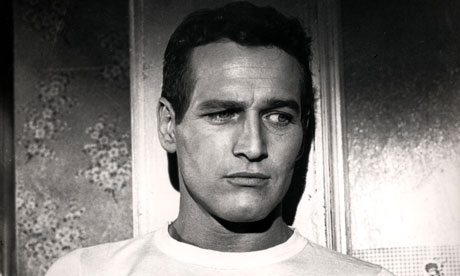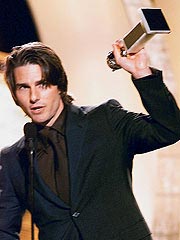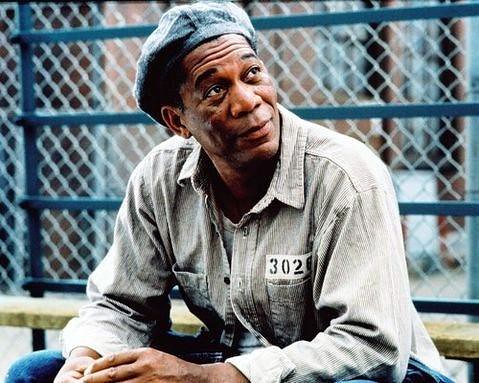Paul Newman was the greatest movie star to ever live. In some ways, he was your stereotypical movie star in that he was classically handsome, charming, charismatic, and lived a rich, luxurious life. But unlike a lot of Hollywood stars he had true character. He was married to the same woman, fellow actress Joanne Woodward, for 50 years, and was one of Hollywood’s most charitable actors. He started the company Newman’s Own in which 100% of its profits goes to charity. So far it has raised over 300 million since its inception in 1982. (link) He also started the non–profit organization The Hole in the Wall Gang - a camp for terminally-ill children. (link)
While there’s no doubt about the fact that the real Paul Newman had character, he specialized in playing people that lacked character and are learning how to obtain it. Think of his most iconic roles in movies such as Hud, Cool Hand Luke, The Sting, Slap Shot, The Verdict, Nobody’s Fool, and, of course, The Hustler and you’ll see that’s true. He was an actor who liked to play people, and who audiences like to watch go from a rebel, misfit outsider to a person who acquires true moral integrity. He didn’t always succeed, as in Hud, as he did in most of his movies like The Hustler, but no matter what, the audience got to experience an authentic performance that was layered with complexity.
The Hustler was released in 1961, and was filmed in black and white. Its story follows Fast Eddie Felson (Paul Newman), a drifter who travels around the country going to pool halls hustling money. Fast Eddie (nicknamed that because he can beat you so fast at pool, and then turn around and lose just as fast) dreams of being the best pool player there ever was, and he goes to play the best: Minnesota Fats (Jackie Gleason). In their first epic pool match (of two), Fast Eddie begins by completely whipping Minnesota Fats earning over $18,000 dollars. Eddie earlier stated that his goal was to earn $10,000 dollars. But, as he says to his manager, his goal had always been to beat Minnesota Fats and “the game is not over till Fats says it is”. Fast Eddie continually shoots pool (for over 25 hours straight) and incessantly drinks bourbon, until he eventually gets drunk and loses all his money to Minnesota Fats.
In that match Eddie met Bert Gordon (George C. Scott), the most ruthless manager and gambler around whose only concern is money. Gordon was the one who advised Minnesota Fats to keep playing Fast Eddie after he was ahead over $18,000 dollars, calling Eddie a “born loser”. After the match, Bert tells Fast Eddie what beat him. (This scene illustrates the way Bert manipulates Eddie into letting him become his manager.)
 |
| Bert Gordon (George C. Scott) and Eddie Felson |
Bert: You got talent.
Eddie: So I got talent? So what beat me?
Bert: Character
Chicago Sun-Times film critic Roger Ebert explains that, “Bert’s secret is that by character he doesn’t mean goodness, honesty, or other Boy Scout virtues. He means the snakelike ability to put winning above any other consideration, and to never tempt the odds.” (link) Fast Eddie, on the other hand, doesn’t subscribe to Bert’s money-oriented philosophy of character.
 |
| Sarah Packard (Piper Laurie) and Eddie |
In the movie, Eddie begins a relationship with the depressed, alcoholic, attractive woman named Sarah Packard (Piper Laurie). These two desperate people are seeking solace from their failed lives and they find comfort in being with one another. In a turning point in the movie, we witness Bert whisper something sinister into Sarah’s ear that greatly upsets her. The viewer recognizes that Bert is manipulating Sarah and trying to bring her down, but Eddie doesn’t realize it yet. Bert wants Sarah out of the picture so that Eddie can shoot pool without any distractions. Bert’s ruthlessness culminates with him seducing Sarah into having an affair with him. This completely degrades and destroys Sarah’s sense of character so much, she commits suicide.
Fast Eddie is devastated and responds to this is by challenging Minnesota Fats to another game of pool. Ebert correctly points out that, “The first meeting of Eddie and Fats was about pool. The second, as Bert correctly predicted, is about character.” At this point in the movie Eddie has acquired true character and he quickly beats Fats in their second match of pool. Fats, in admiration, admits that Eddie has indeed truly beaten him. In the end and at the most tragic cost, Eddie discovered what it took to be the best.
 |
| Minnesota Fats (Jackie Gleason) vs. Fast Eddie |
The role of Fast Eddie gave Paul Newman the chance to show his full range of emotion and talent. At this point in his career, Newman wasn’t yet thought of as a great actor and was considered to be just another Marlon Brando clone. Brando emerged as the master of the method-acting style in the 1950s, and Newman was a method actor. Method acting is a form of acting that pushes the actor to their limits in order to try and achieve as much realism in their performance as possible.
The first quality that we see in Fast Eddie is that he’s charming, and Newman easily conveys that facet of him with the help of his perfect, mischievous smile. In the early part of his career, Newman was frequently criticized for being too good looking and he couldn’t be taken seriously as an actor. Critics said that he too often relied on his good looks and his trademark beautiful blue eyes. But in The Hustler, his handsome appearance was an important feature of who Fast Eddie was, and his trademark blue eyes could not be seen in the movie as it was filmed in black and white.
Another important part of Fast Eddie is that he’s a drinker, and few actors can play drunk as convincingly as Newman. Eddie was also a person who could be stubborn, mean and cruel, and Newman never backed down and tried to soften him up. He played the character straight and allowed the audience to see him for all his strengths and faults.
The most crucial quality of Fast Eddie is his undeniable talent at shooting pool. Newman definitely appears as if he knows how to handle a pool stick. But more than that, Newman is able to convey the character’s drive to be the best there is and in one of movie’s best scenes we listen and watch Newman describe his undeniable talent. In this scene the viewer can’t help but be drawn to Eddie, despite his faults, and we’re fully mesmerized at what he’s conveying to us.
Newman is also able to express anguish as well as any actor. In a memorable scene from the movie, Fast Eddie gets caught hustling and his thumbs are broken. When this happens, all we see is Newman’s face and when we hear his anguished cry the viewer can’t help but wince and feel the pain along with him. In another critical scene, when Eddie discovers that Sarah has committed suicide. Newman’s reaction is devastating and heartbreaking to watch.
By the end of the movie when Eddie confronts Bert and has one final match against Minnesota Fats, Newman carries himself in a different way. He’s now a more direct and focused person, compared to before in their first match when his cockiness was a way of him hiding his insecurities. In the final scene of the movie, Newman gives one of the most passionate and emotionally wrenching speeches ever delivered on film.
For The Hustler, Newman received his second Oscar nomination for best actor but lost out to Gregory Peck for To Kill a Mockingbird. Throughout his long career, Newman would receive a total of 9 Oscar acting nominations and he won once, for best actor, for The Color of Money. In Color he reprised his role of Fast Eddie Felson, twenty-five years after The Hustler. While his performance in The Color of Money was great, many took it, including myself, as belated amends for his performance in The Hustler.
Newman specialized in playing anti-heroes even though he himself was not as flawed as the people he performed. In The Hustler, Fast Eddie Felson doesn’t acquire character until after his girlfriend commits suicide and he knows what’s truly important in life. While Paul Newman, on the other hand, demonstrated his character in the way he lived his life every day. Including in his acting, where Newman created some of our most memorable film characters such as Fast Eddie Felson.



































